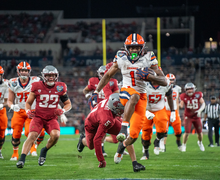Ask the Experts : Do you think it’s possible for the Occupy Wall Street movement to be effective?
Occupy Wall Street spread globally Saturday, leading more than 900 cities throughout the world to join a movement that originated in the United States.
Occupy Wall Street began Sept. 17, when 1,000 people marched through the streets of New York City. Several hundred people spent the night in Zuccotti Park, a small square in the city’s financial district. Since then, people have continued to converge daily, constantly increasing in numbers.
The leaderless movement has focused on the protest of economic and social inequality. Many participants have voiced disapproval of the inequitable relationship between government and large corporations. ‘We are the 99 percent’ has become a popular slogan of the movement, referring to the notion that the majority of wealth in America is owned by 1 percent of the population.
At this point no objectives have been made official, but many have made it clear they will not stop until change has occurred.
The movement has gained international attention partially due to conflicts between law enforcement and protesters. On Oct. 1, more than 700 demonstrators were arrested as they marched across the Brooklyn Bridge. Two weeks later, protests in Rome, Italy, became violent due to a faction of participants.
The Daily Orange asked the experts: Do you think it will be possible for the Occupy Wall Street movement to be effective if it continues without leadership or a clear set of demands?
‘Grassroots uprisings, in some sense, are not normal organizations like political parties or even an official interest group, and therefore, they don’t need agendas and lists of goals and leaders and sub-leaders. They don’t need to be organized in a way that a typical group would be. Their effectiveness lies more in the number of people who become involved and the extent of which it grows to other places, which is beginning to be extensive.
This phenomenon has unknown potential. I kind of see it as an amorphous thing that can change quickly into something else, but it’s organized around a single goal, a single premise, and that is that it’s not right for some people to have all the money and other people to have little. I think that’s the goal, and leaders aren’t necessary if that goal is so attractive that it brings other people to it. The power is in numbers of people, not in the organization of the grassroots effort.’
Pamela Shoemaker
John Ben Snow Professor in the S.I Newhouse School of Public Communications
‘Probably not. Mass protests, often it seems to me, are without leadership. What made the civil rights movement different, for instance, was that, divided sometimes and explosive sometimes, there was a sense of identifiable personal leadership. And of course it also had an explicit policy agenda. The Wall Street folks apparently, at this moment, don’t have that. If it’s too peaceful, it’s too quiet, it’s too rational — who has to deal with it? Politics is about violence, about conflict. That’s why you need the leadership and the policy objectives. Now, could it be something else over the world? Maybe, but it would take events that spark violence, probably, and cause many more people to rise up on both sides.’
Robert McClure
Professor of political science and public affairs in the Maxwell School of Citizenship and Public Affairs
Published on October 18, 2011 at 12:00 pm





